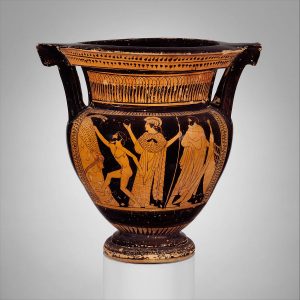Chapter Eight – Myth & Revenge
Andy Gurevich
In addition to some pretty horrific events that take place in Medea, the way the characters of Jason and Medea degenerate is pretty profound. It has all the making of a Greek Tragedy.
Aristotle set out the characteristics and requirements for tragedy in The Poetics. The intention of a tragedy is to bring about a feeling of pity and fear in the audience which leads to the purging of powerful emotions.
A good tragedy causes us to place ourselves in the place of the tragic hero, and evaluate the reasons for his downfall. The hero is usually someone above the ordinary man—he is a part god, or super hero. His position and his fall remind us that no one is exempt from those great flaws in character that cause a downfall.
For the Greeks one of the great character flaws is pride, overbearing pride, hubris, the Greeks called it. It is a pride that causes the hero to think he is like the gods.

Does Jason fill this bill? If you remember Jason’s first words once the Golden Fleece was in his hands was “What a great prize I have won!” In fact, he did very little to gain the fleece. He quickly forgets about all Medea has done. She has to remind him, and he realizes he still needs her help to escape from Colchis and Aeetes.
Chapter 1
Early on, Medea realizes the truth about Jason, but she continues to help him, with horrifying results. What does Medea do as they are escaping from Aeetes and his fleet? What is the meaning of the goddess Athena’s words? It’s not in this version, but in trying to return to Greece, the Argos traveled all over, lost, for years. The return voyage bears several similarities to the places in the Odyssey. Here is a copy of a map of Jason’s travels (there are several variations).
In order to be safe, Medea must be married to Jason so the king of Phaeacia will protect her from Aeetes. A quick wedding is prepared and Hera blesses their union.
Chapter 2
When Jason is back in Iolcus, he must take revenge on Pelias. This is all part of Hera’s scheme to punish Pelias. Again, Medea takes the lead. In an ironic and cruel plot, Medea uses her powers on Pelias the same way she did on Jason. If Medea is aware of Jason’s falseness and self-centeredness, why does she continue to help him? Hera is pleased with the outcome; she has her revenge on Pelias. Take note of what Hera does now that her plot has come to fruition.
Chapter 3
The son of Pelias, Acastus, is now the king of Iolcus. He was also one of the Argonauts and friend to Jason. He is another person between a rock and a hard place. The law gives him leave to kill Jason and Medea, but he can’t, so he banishes them. They have no home, but come to Corinth where they are accepted by King Creon. For ten years they live happily, having two sons.
We are told by the Apollonius that Medea wore the crown of modesty on her head. So what causes this happiness to come unraveled? Medea’s only flaw here is that she grew old. Jason is disgusted by Medea and seeks out the beautiful young daughter of King Creon, Glauce. What is his motivation?
What “loophole” does Creon find in Jason and Medea’s marriage that would allow Jason to freely marry Glauce? Why does Medea’s being a barbarian become an issue after ten years of marriage?
At the end of Chapter 3, Medea makes a remarkably modern speech about the status of women in the society and her own status in particular. It gives a good insight into the position of women in ancient Greece.
Chapter 4
Medea and Jason argue at the beginning of this chapter. It’s almost like we are eavesdropping because the conversation is so realistic and modern in many of the points each one makes. Who do you think is more justified in their anger? Does this conversation reflect the character and personalities of Jason and Medea?
Chapter 5
While Medea ponders her fate, King Aegeus from Athens comes. Medea knows the king and greets him. She tells him that Jason has abandoned her. In this scene, one can feel sympathy for Medea through Aegeus’s words. He says, “For those who dishonored you are inviting the gods to judge them.” Medea begs Aegeus to take her to Athens and he agrees. Maybe because she knows she will have a safe haven, she plots some terrible revenge on Creon and especially Glauce. For Jason, she has another plan—to deprive him of everything he loves, including his sons.
Chapter 6
Medea anguishes over her plan to kill her own sons. She considers taking them into exile with her, but realizes she must not spare them. Pay attention to the reasons she gives early in the chapter for killing her sons. What do they say about her? Did you expect her to offer reasons like this? One thing to note is that the Greeks very often would leave unwanted children on hillsides to die, so there may not have been the same respect and reverence we have for children today. From the ancient Greek perspective, this act may not have been as profoundly horrid as it is to us.
A messenger arrives to tell the story of the death of Glauce and Creon. In Greek drama, graphic deaths took place off stage and were reported by a messenger. The death is pretty ghastly. Afterward, Medea puts all love, passion and tears aside and gives her sons herbs to put them in a deep sleep and kills them.
Jason arrives soon after, and Medea presents his dead sons to him. How does Jason react? Read his response carefully as it provides great insight into his character. Some versions show how Jason wandered, homeless and unhappy, and sought shelter on the Argos. One day, while he was sleeping under the stern of the boat it collapsed and killed him.
The ending of this story is a bit ambiguous. Medea has killed her own brother, King Pelias, Glauce, Creon, her two sons. The most difficult to imagine is her killing her sons. Wouldn’t the gods punish her? How come Jason didn’t try to kill her, after all he has just lost everything. Helios, Medea’s grandfather, arrives from the heavens and takes her and her sons away to Athens (some versions say she went to Mt Olympus). Is the author, Appolonius, trying to justify her behavior to us?
Finally, there is Jason’s final words about man’s suffering. It is a remarkable statement Jason makes—“…the deathless gods are not to blame. For there are no gods!” Jason, the first atheist? Why does he say this? Does this provide a clear insight into Jason’s character?
With all of this to consider, let’s turn to Jason as a hero. Does he fit the hero’s journey? He does get the Golden Fleece. He has help, maybe too much, from Medea. He returns with the prize. Everything is good. What, then, causes the tragic events of this story? How much is Medea to blame? So, do Jason’s character flaws make him less of a hero, even an anti-hero? More importantly, what lessons do we learn from this story?

Readings:
Make sure to revisit the “History and Culture” materials for this myth in the previous chapter.
- Jason and the Golden Fleece, Greece, [This is a longer one!]
- Medea, Greece, [This is a longer one!]

